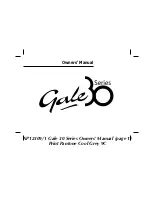
28
Ground:
A point in an electrical system that has zero voltage. Usually, the chassis of an electrical component
is at ground potential and thus serves as the return path for signals as well as for power circuits.
Hertz (Hz):
A unit of frequency equal to one cycle per second.
Isolation Transformer:
A transformer designed to provide magnetic coupling between one or more pairs
of isolated circuits, without introducing significant coupling of any other kind between them,
such as electrostatic or conductive coupling.
Joule Rating:
A measurement of how much surge can be absorbed by a surge suppressor device.
The higher the joule rating, the more surge it can absorb.
Peak Current:
The maximum current which flows during a complete cycle without permanent change in breakdown
ratings or published life specifications.
Power:
The energy dissipated into an electrical or electronic circuit or component that is conducting either AC or DC.
Electrical energy developed to do "work" such as the voltage from an amplifier used to drive a speaker.
Power Line:
Two or more wires conducting electric power from one location to another.
Radio Frequency Interference:
Any electrical signal capable of being propagated into and interfering
with the proper operation of electrical or electronic equipment. The frequency range of such interference
may be taken to include the entire electromagnetic spectrum.
Spike:
An abrupt transient which comprises part of a pulse, but exceeds its average amplitude considerably.
Surge:
A large, sudden change of voltage or current, usually caused by the collapse of a magnetic field
or by a shortened or opened circuit element.
Surge Protector:
A device which protects component circuitry from high alternating voltage peaks or transients.
Transient:
A momentary surge on a signal or power line which may cause component breakdown and failure.








































